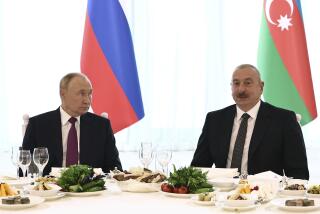A Land Divided: The Armenia/Azerbaijan Crisis : CHAPTER 6: THE POLICY : The Kremlin Justifies Its Troop Moves
- Share via
As quickly as the new Communist leaders took office in Azerbaijan, they turned around and offered to share their power with the Azerbaijan Popular Front--that is, those elements of the nationalist shadow government that had not been seized and jailed by Soviet authorities during the previous week.
Nearly 200 Azerbaijanis suspected of belonging to the front had been jailed to that point, crimping the group’s effectiveness but not stopping it from pursuing a nettlesome harassment campaign against the government and the troops propping it up.
“The Popular Front will be offered something, something substantial,” a well-placed party source said. “It will not be as much as they want but . . . more than they could hope to win” by making good their threat to launch a prolonged guerrilla war.
“We all want to see peace there,” the party official said.
Quickly, however, party-sanctioned peace in Baku was scuttled by political war in Moscow--a messily public argument over the need to have sent troops into Baku and, by implication, the wisdom of relying on the Azerbaijani Popular Front as a political partner.
While the new Azerbaijan Communist Party wooed the Azerbaijan Popular Front, Soviet Defense Minister Dmitri T. Yazov publicly accused the rebel group of plotting to seize power with 40,000 militiamen on the day the Soviet army burst into Baku and put down the lingering unrest there at the cost of 83 lives by official count.
“This is not a slip of my tongue--I mean power ,” Yazov told the Soviet government newspaper Izvestia in Baku, where he directed the weeklong operation to quell violence in the city. “They were preparing to seize it and were so sure of their success that . . . 24 hours before troops were introduced into Baku, they announced (their own) state of emergency.”
Yazov’s inflammatory charges were countered by the release of a telegram sent to Gorbachev from two army colonels in Baku immediately before troops swept through the city. The officers--identified as A. Savalyov, chairman of the officers’ assembly in Baku, and A. Rusakov, head of the political section at the Baku Military Academy--warned against military intervention. It did not mention the mobilization of rebel fighters or an imminent seizure of power by force.
“The Popular Front controls the situation in the city,” Savalyov and Rusakov said in the wire, according to an account in the newspaper Komsomolskaya Pravda. “We consider that the use of armed force would lead not merely to the isolation of servicemen but to a complete disruption in relations (with the local population), that it would threaten the security of their families and that it would trigger a growth in anti-Russian feeling.”
The argument even spread to the Inter-Regional Group of Deputies, 13 members of which asked to debate the issue in an emergency session of the Supreme Soviet, the national legislature.
While the central Soviet government fumbled, an independent nationalist group, the Latvian People’s Front, brought the warring Armenians and Azerbaijanis to the negotiating table.
The peace process actually began Jan. 25, when guns fell silent on the Armenia-Nakhichevan border with the signing of a cease-fire agreement between the Armenian All-National Movement and the Nakhichevan Popular Front--significantly, independent nationalist organizations with real control over combatants.
Hopes for a wider peace came a day later, when the Latvian People’s Front announced that the Azerbaijani Popular Front, which controlled a larger area and a greater guerrilla force, also agreed to try to reach a similar agreement with the Armenian All-National Movement.
The talks, pointedly, were scheduled in the Latvian capital of Riga--itself the site of a significant nationalist and secessionist movement--and effectively excluded the Kremlin.
Equally pointedly, the negotiations will not touch on the future of Nagorno-Karabakh, even though that Armenian enclave within Azerbaijan has been the focus of bitter and bloody warring between the two ethnic groups for the last two years--indeed, to lesser extents, for the last 70 years.
Instead, the two groups agreed to limit their discussions to disengaging their paramilitary forces, easing tensions to avoid further clashes, exchanging hostages, resettling refugees and other humanitarian concerns.
More to Read
Sign up for Essential California
The most important California stories and recommendations in your inbox every morning.
You may occasionally receive promotional content from the Los Angeles Times.













